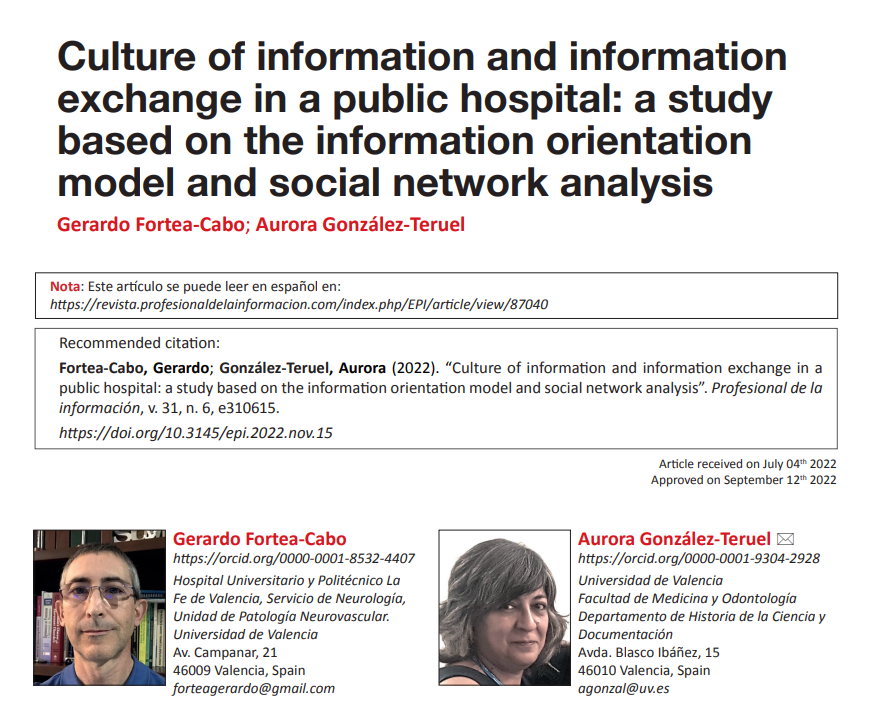
Culture of information and information exchange in a public hospital: a study based on the information orientation model and social network analysis
On Sale
€15.00
€15.00
Abstract: The structures of hospitals have evolved to make them centre on patients and their pathologies, with care procedures that are both interprofessional and interorganisational. This has given rise to work environments made up of teams obliged to collaborate in their problem-solving, with an essential focus on proper collaborative information behaviour (CIB). The aim was to study this behaviour in a clinical service of a hospital in relation to two aspects: information culture (IC) and the exchange of information. This entailed designing a two-part descriptive study. The first step was to administer a survey based on the information orientation model to know more about the service’s IC. The second phase focussed on the exchange of information from the perspective of an analysis of social networks. The main characteristic of IC was its proactive nature, especially in the use of information to improve one’s own work (mean = 4.58) and to respond to changes and new developments relating to work (mean = 4.18). The factor that least characterised IC was control, particularly in relation to knowledge of the objective of the activity itself (mean = 2.67) and the dispersion of information about hospital processes (mean = 2.64). On social networks, factors contrary to an interprofessional CIB were identified, such as homophily and low reciprocity in terms of relationships. In practice, the results identified a need to reinforce the perception of information as a resource, the proper use of which benefits job performance at both an individual and group level. A need to reinforce flows of internal hospital-related information was likewise evident. From a theoretical and methodological point of view, a useful tool is made available for diagnosing the collaborative information behaviour of an organisation and designing strategies to improve it.
Resumen: Los hospitales han evolucionado hacia estructuras centradas en el paciente y su patología, organizando la labor asistencial de forma interprofesional e interorganizacional. Esto ha dado lugar a entornos laborales formados por equipos que deben colaborar en la resolución de problemas, siendo esencial un adecuado comportamiento informacional colaborativo (CIC). El objetivo de este artículo es estudiar este comportamiento en un servicio clínico de un hospital con relación a dos aspectos: la cultura informacional (CI) y el intercambio de información. Para ello se diseñó un estudio descriptivo en dos partes. Primero se administró un cuestionario para conocer la CI del servicio, diseñado a partir del modelo Information Orientation. Después otro centrado en conocer el intercambio de información, adoptando la perspectiva del análisis de redes sociales. La principal característica de la CI fue la proactividad, especialmente el uso de información para mejorar el trabajo propio (media=4,58) y para responder a los cambios y nuevos desarrollos relacionados con el trabajo (media=4,18). La dimensión que menos caracterizó la CI fue el control, especialmente con relación al conocimiento del objetivo de la propia actividad (media=2,67) y la dispersión de la información sobre los procesos del hospital (media=2,64). En la red social se identificaron aspectos contrarios a un CIC interprofesional como es la homofilia y la baja reciprocidad de las relaciones. En la práctica, los resultados identificaron la necesidad de reforzar la percepción de la información como un recurso, cuyo uso adecuado beneficia el desempeño laboral, a nivel individual y de grupo. Igualmente se evidenció la necesidad de reforzar los flujos sobre información interna del hospital. Desde un punto de vista teórico y metodológico, se presenta una herramienta útil para diagnosticar el comportamiento informacional colaborativo de una organización y diseñar estrategias para mejorarlo.
Resumen: Los hospitales han evolucionado hacia estructuras centradas en el paciente y su patología, organizando la labor asistencial de forma interprofesional e interorganizacional. Esto ha dado lugar a entornos laborales formados por equipos que deben colaborar en la resolución de problemas, siendo esencial un adecuado comportamiento informacional colaborativo (CIC). El objetivo de este artículo es estudiar este comportamiento en un servicio clínico de un hospital con relación a dos aspectos: la cultura informacional (CI) y el intercambio de información. Para ello se diseñó un estudio descriptivo en dos partes. Primero se administró un cuestionario para conocer la CI del servicio, diseñado a partir del modelo Information Orientation. Después otro centrado en conocer el intercambio de información, adoptando la perspectiva del análisis de redes sociales. La principal característica de la CI fue la proactividad, especialmente el uso de información para mejorar el trabajo propio (media=4,58) y para responder a los cambios y nuevos desarrollos relacionados con el trabajo (media=4,18). La dimensión que menos caracterizó la CI fue el control, especialmente con relación al conocimiento del objetivo de la propia actividad (media=2,67) y la dispersión de la información sobre los procesos del hospital (media=2,64). En la red social se identificaron aspectos contrarios a un CIC interprofesional como es la homofilia y la baja reciprocidad de las relaciones. En la práctica, los resultados identificaron la necesidad de reforzar la percepción de la información como un recurso, cuyo uso adecuado beneficia el desempeño laboral, a nivel individual y de grupo. Igualmente se evidenció la necesidad de reforzar los flujos sobre información interna del hospital. Desde un punto de vista teórico y metodológico, se presenta una herramienta útil para diagnosticar el comportamiento informacional colaborativo de una organización y diseñar estrategias para mejorarlo.
